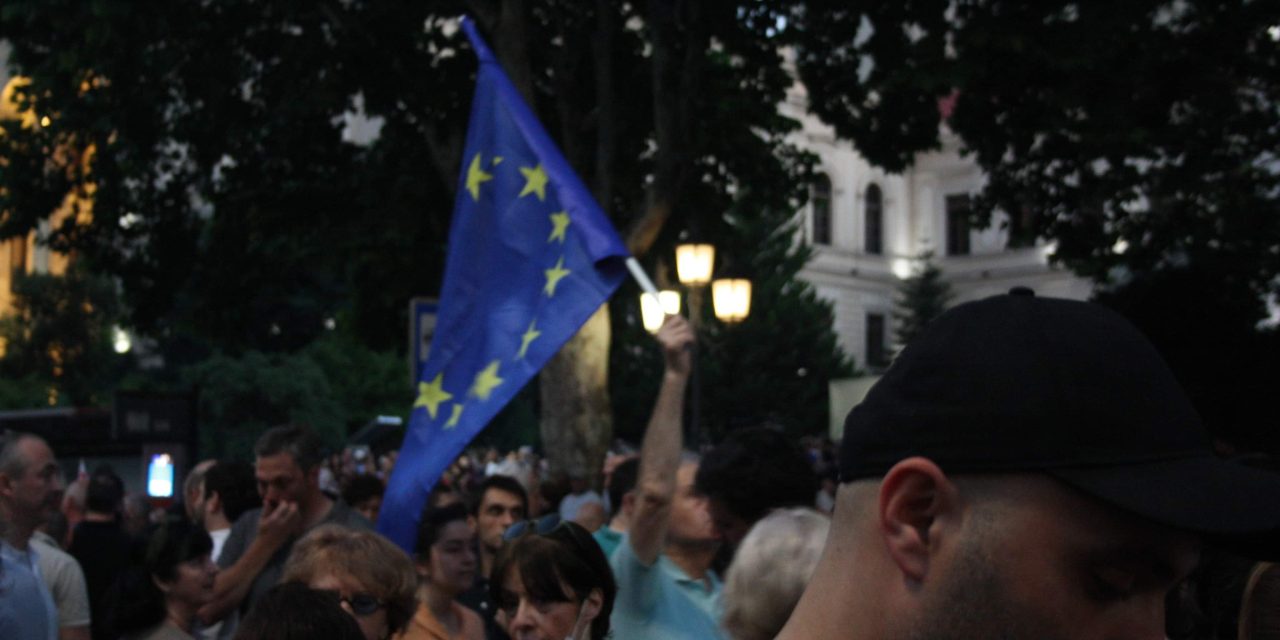Nestled at the crossroads of Europe and Asia, Georgia, with its rich history and unique geopolitical position, has ardently sought integration with the West since gaining independence in 1991. Support for EU membership among citizens, as indicated by a 2023 NDI poll, stands at a comfortable 80%, encapsulated in the phrase “I am Georgian, therefore I am European.”
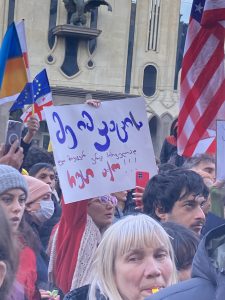
Protests in front of the Georgian Parliament building against a new law.
On November 8, 2023, the European Commission’s 2023 Enlargement Package assessed the progress made by several nations, including Georgia, on their paths toward EU integration. Despite being a trailblazer in implementing EU-mandated reforms, Georgia did not secure the sought-after candidate status, marking a surprising setback.
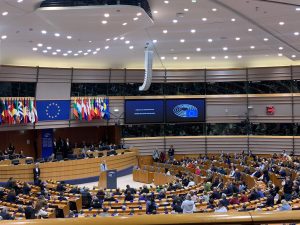
November 8th EU Parliament session.
Since the launch of the EU’s Eastern Partnership (EaP) in 2009, Georgia played a lead role in advocating for increased EU involvement in the region. Strides in implementing the Association Agreement and Deep and Comprehensive Free Trade Agreement (DCFTA) surpassed those of Moldova and Ukraine. However, the June 2022 setback, when Georgia did not receive candidate status, was unexpected. Instead, the government received a clear outline of objectives, with the prospect of obtaining candidate status contingent on meeting 12 priorities.
The criteria for accession shared striking similarities with those presented to Ukraine and Moldova. However, a significant divergence was in Tbilisi’s actions and narrative over the past two years.

Georgian Parliament on 26th of May, Independence Day.
Ursula von der Leyen, President of the EU Commission, expressed concern, stating, “My colleagues fully support the aspiration of the majority of the population of Georgia to join the EU. These aspirations should be more reflected in the actions of the government, which should work more with the opposition and civil society.”

President Salome Zourabishvili and Commission chief Ursula von der Leyen in Brussels on 22 January 2021.
The Georgian Dream government’s recent trajectory has been marked by perplexing decisions and statements, including critical remarks against the West and controversial choices such as resuming direct flights with Russia and considering a foreign agents law mirroring Russia’s.

Dart boards of Vladimir Putin being sold at an anti-Russia protest in Tbilisi.
These policy choices have led to a perception of a pro-Russian leaning within the Georgian government, inconsistent with the widespread anti-Russian sentiment among the Georgian populace. The repercussions extend beyond domestic dissatisfaction, straining relations with the EU and several member states. Tensions escalated, resulting in decreased political support from traditionally friendly nations, notably the Baltic states, due to Georgia’s refusal to join international sanctions on Russia.

Protests against not enforcing sanctions in Tbilisi.
Crucially, these contentious developments unfolded post the European Commission’s decision in June 2022, indicating a potential correlation. The Commission’s refusal to grant Georgia candidate country status appears to have triggered a series of questionable policy choices by the Georgian Dream government, complicating the nation’s path toward EU integration.
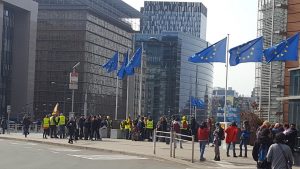
Brussels, 8th November.
Illia Darchiashvili, the Minister of Foreign Affairs of Georgia, emphasized the significance of receiving candidate status, stating, “Receiving candidate status is a priority task for the EU integration policy, and the most important issue on the agenda of Georgia’s cooperation with the member states.”
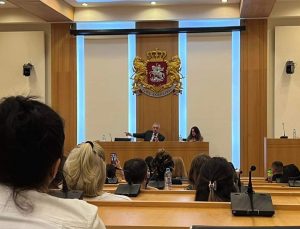
Press Conference at the Georgian ministry of Foreign Affairs.
The latest reports from the European Parliament and the European Commission indicate Georgia’s progress in aligning with EU standards. The 2023 progress report on Georgia highlights positive advancements in the rule of law, democratic institutions, and economic reforms. Challenges persist, including the need for continued judicial and electoral reforms, effective anti-corruption measures, and the resolution of regional conflicts.
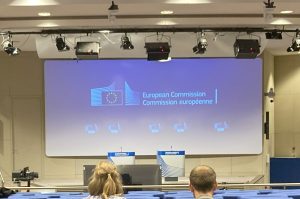
Press Conference at the EU Commission.
Despite the hurdles, there remains optimism. Vano Chkhikvadze, EU Integration Program Manager at Open Society Georgia Foundation, expressed hope, saying, “Next year, in the fall of 2024, Georgia will have a chance to catch up with Ukraine and Moldova and open ascension negotiations with the EU. After this stage, ascension is already coming, and one year will not be enough for Ukraine and Moldova to complete the stage of negotiations.”
The European Parliament’s Delegation to the EU-Georgia Association Committee plays a pivotal role in fostering dialogue and cooperation. Georgia’s journey towards EU membership reflects the broader narrative of European enlargement. The country’s progress, as outlined in recent reports, showcases its commitment to reforms and European integration. As Georgia navigates the complexities, the challenge lies in realigning its trajectory and reaffirming its dedication to shared values that define its relationship with the European Union.

2023 protests in Tbilisi.
